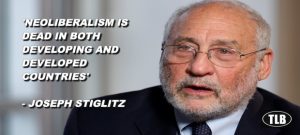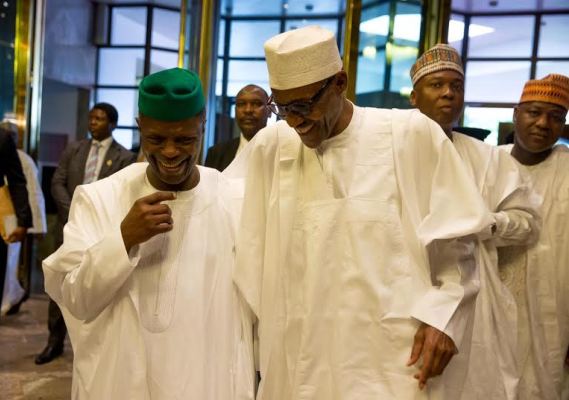Cracking Nigeria’s ‘War Economy’
Grappling with and getting out of the current phase of the Nigerian crisis remains a key concern in the country. Among members of the Nigerian elite in their different segments and configurations, leading questions are emerging. Beyond those who pose theirs in the newspapers, others are ruminating. Such as this: “The people put their faith in the People’s Democratic Party, (PDP) for 16 years. Nothing much came out of it. An opportunity presented itself and the APC was voted in. It is now a stalemate altogether. What happens next?”

Vice-President Osinbajo: a lawyer, lecturer and preacher fires national imagination but will resurgent neoliberalism leave him him alone?
They are pointing out minefields in the polity capable of precipitating a tectonic upsurge in the sense that the social order falls beyond rescue. Former President Obasanjo conveyed this dimension of the concern by expressing the hope that Nigeria itself does not slide and sink like the PDP. By that, he is alerting of such possibility. Kalu Idika Kalu, an IFIs economist and a former Minister of Finance cautions against expectations that the country could exit from recession anytime soon. That would be nonsense, he says. Acting president, Prof Yemi Osinbajo, said in Kaduna that the violence there would not end within a day or two but would take time. Elsewhere, he talked about modifying the anti-corruption war.

Chief John Oyegun: presiding over a fragmented house
What all these point to is where none of the often stated key commitments of the regime – security, economy and anti-corruption – have made such satisfactory progress in being resolved. Gains have been made, no doubt, but so also the glitch in each of them. Compounding this is whereby the ruling party is, again, in the words of Obasanjo, not a strong party in power just as the PDP is, according to him, not a strong party in opposition. The Board of Trustees of the ruling party could not even be constituted, before talking of being inaugurated. What was done, instead, was to sort of amend the name to an conclave of elders. Before this, Bola Tinubu, a national leader of the party found it expedient to write to the national Chairman, asking him to resign. Quite early in the day, the party’s own view of sharing of positions never sat well with the president. This is beside the internal crises within the party in many of the states now, especially Kano, Kaduna and Gombe where everything is in the open. On top of all these, the president is medically challenged and has been away.
So, the fear in terms of what next about this has substance to it. Presidential ill-health and absence is the point of controversy now. Situated almost across the board as the major source of the confusion, the president’s absence has created a situation for people to see a different kind of presidential actor on the stage. Enthralled by a more cerebral deputy, the country indicated its preferences before intellectual care-givers started to remind it that it is not it in statecraft to praise the deputy at the expense of the boss. If it were the case that the president were inclined to leave and take care of his health or had been declared incapacitated or the elite had found a way to make that request, there the matter would have rested. The acting president would have simply transited to Mister President. Right now, that is not the case. Instead of anything of that sort, all the evidence point at a president preparing to resume. What does that present as problems?

President Buhari: badgered by baggage?
There is a checklist. One, is the baggage of the president, both as a person and as head of government. He has already been framed into a structural lame duck. Herdsmen violence and violence in Southern Kaduna have particularly damaged the president’s reputation considerably. Some observers doubt that he can successfully construct a counter-narrative of his perceived implication in those violent conflicts. The president has, rightly or wrongly, been so narrated in a way that it would take so much to overcome the image he currently has in the minds of the people in terms of being an uncaptured actor in managing ethnic and regional differences. The all time poser is that which says that if the president wants arrests, the Inspector-General of Police will find the suspects for any act of criminality. The logical inference is that the president did not ask for arrests. It may not be this straightforward but as a critic says “the powerful perception now is that herdsmen violence across the country and Southern Kaduna violence are reinforcement of the fault lines from the quarter it should not be coming from at all – the president and the presidency”. It attests to Joseph Nye’s point that those who control the narrative are also the winner in any war. So, for those who think along this line, the first problem is the image problem for the president in the event of his resumption of duties from his medical vacation.
But, for them, this is only a further complication of problems they feared long before now. Their fears started from the moment some persons who had been enthusiasts of the president either could not be sighted around the president or were quietly and even publicly turning down offer of appointment from the regime. That, they saw as danger signal in a country where people crave government appointment, even by regimes they share no value commitments. Their prayer was that the cabinet, when constituted, would be a replica of Obasanjo’s in 1999 which they think was distinguished just because it contained a number of persons who were not mediocre or servile in attitude. “If President Buhari does not come up with such a cabinet, then the regime would have brought 2019 to 2015” was the view at the time. The waiting game went on much longer than was thought. When the cabinet was released, it fell short of the expectation. There were many gentlemen there but not the kind of father figures believed to be capable of filling the gaps in presidential personality. Above all, there were too many people in the whole governmental set up with one unique capability: people perceived to be capable of legally and neatly ‘selling’ this country to themselves unlike the cash minded corruption perceived to have been definitive of the players in the Goodluck Jonathan administration. The observers could not understand the paradox of a Buhari sentencing his regime to hardheaded neoliberals even while insisting on being a statist.


Joseph Stiglitz: former Chief Economist of the World Bank, a thinker and an attacker of the IFIs over neoliberalism
The Economic Growth and Recovery Plan that the government is fiddling with is said to reflect this template. In other words, there is a re-calibration of the much talked about phenomenon of cabals into two. It is part of the politics of the crisis. There is the local cabal and the foreign cabal. The local cabal is defined as the one in and around the president who meddle in appointments and the authoritative process from behind the scene. The foreign cabal is the one that is feared to want to buy this country through privatisation or selling of assets, private-public partnership and bail outs. There are those who are sure that this foreign cabal will legally sell this country to themselves and it will take a revolution to recover it. The critics are sentimental about this, pointing out how Nigeria is the only black state in the world not routinely dictated to by any powers but now in the danger of being taken over, and overwhelmed economically.
There is a sense in which this is seen as the crux of the matter. While President Buhari is, according to The Economist, ponderous and generally seen as outdated or even incompetent, the alternatives available also carry risks as far as economic nationalists can see. “People will be taken for granted by the neoliberal sensibility circulating around power if they consolidate”. The impending bailout of N7.1b for the power sector is cited as a prime example of the issue at stake while the collapse of private airlines is cited with reference to how there is nothing called a private sector to which the Nigerian economy can be handed over.

The late Chief Awolowo
So, apart from the insecurity crisis; the dialectics of the anti-corruption war; weak ruling and opposition parties and the politics of presidential ill-health, the stalemate in Nigeria stretch to a mighty clash between statists and resurgent neoliberalism. In effect, there are quarters that believe Nigeria is in a war economy now. The question is, what is to be done? What does a war economy demand? Might we be getting to the stage Chief Obafemi Awolowo thought about decades ago? Mokwugo Okoye, the late foremost nationalist reported how the equally late Chief Obafemi Awolowo once expressed the hope that, someday, a Bismarck or a Garibaldi or a Stalin would rise in Nigeria to weld the country’s different components. Okoye added immediately how the statement must have reflected a low moment in the sage’s democratic thermometer. He probably did not need to do that since Chief Awolowo himself eventually had opportunity to openly express doubt that Nigeria would experience democracy in his life time. Nigeria did not disappoint him. He was dead and gone to his grave even before the June 12 rupture in 1993.
Awo’s privileging of a Garibaldi, a Stalin or a Bismarck would satisfy the best way of confronting the national question underpinning the current crisis through the instrumentality of a charismatic, knowledgeable and acceptable leader who can galvanise and give reality to the purpose of politics which is empowerment of the people. And truly make the greatest happiness of the greatest number definitive of politics. But, from where does this come? Who is there in APC or PDP that fits this bill? While the question of which of the existing parties might have a Nigerian version of a Garibaldi or a Stalin or a Bismarck is a matter for the people to decide in 2019, the urgent question is how best to fill an impending gap. That is, gap in the sense of Buhari’s ponderousness on the one hand which becomes an issue once he is resuming and the fear of Osinbajo being overwhelmed by local and international variants of the cabals seeking to pocket Nigeria.
So far, there are as many positions as many people ruminating on the plausible problem once President Buhari resumes and has no plan to leave and take care of his health and, in which case, the constitutional succession process does not apply. Intervention has particularly found the position that a war economy needs a war cabinet most attractive and has already argued its preference in an earlier editorial. This paper has found very apt the point made by proponents of what may be called a war cabinet or a government of national unity or whatever, that it frees Nigeria from Buhari’s ponderousness without leaving Osinbajo, (whether as actual, acting or Vice-President) vulnerable to neoliberal take-over. It is pointed out that if Obasanjo could do it in 1999, it can still be done in 2017. And that it may even be more relevant now that forces of neoliberalism are more formed, more powerful, bolder but even more incompetent and heartless. Finally, it is pointed out how it leaves everybody a winner because it means that, for the next two years, Nigeria is moderated at the federal and state levels by an expanded cabinet of people of pedigree and people without immediate political ambition. It thus offers reconciliation and peace. Whether the intellectual paparazzi who control discourse in Nigeria would be comfortable with the implication of this for their immediate ethnic, regional, religious, ideological, organisational or political agenda is a different question.




























